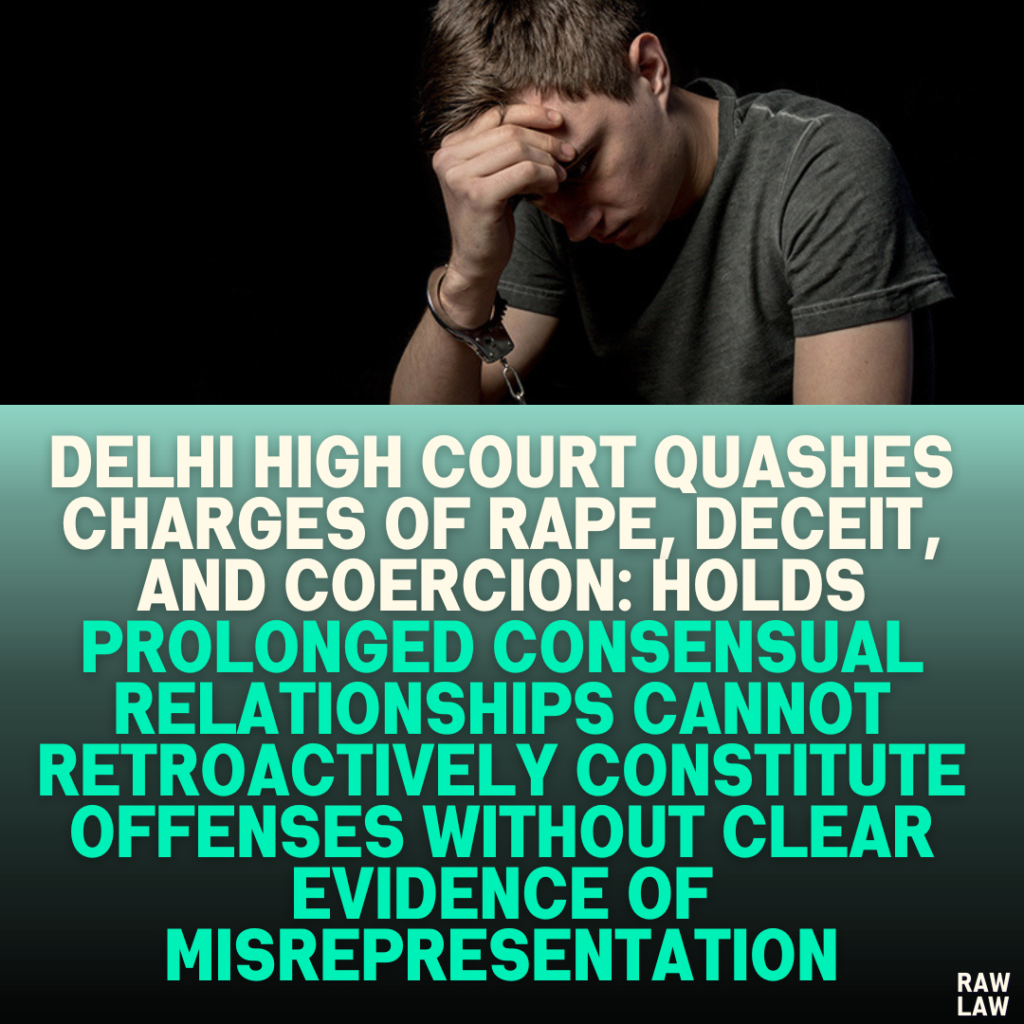1. Court’s Decision
The Delhi High Court quashed the FIR and the charges framed under Sections 328, 376, 323, 377, 493, 509, and 506(Part I) of the Indian Penal Code (IPC). The Court concluded that the evidence and allegations presented by the complainant did not establish a prima facie case strong enough to proceed with a trial. It held that the complainant’s narrative was inconsistent, lacked corroborative evidence, and did not raise the “grave suspicion” required to frame charges.
2. Facts
- The Relationship: The complainant alleged that she met the petitioner in October 2015 and began a consensual relationship based on the petitioner’s promises of marriage. They cohabited for over two years, during which the petitioner allegedly deceived her about his marital status and coerced her into unnatural sexual acts.
- Alleged Deception: The petitioner allegedly conducted two sham marriage ceremonies with the complainant, first in 2015 in Amritsar and later in 2017 at their residence in Delhi, to validate his promises. The complainant later discovered the petitioner was married and claimed he assured her he would divorce his wife and marry her.
- Alleged Abuses: The complainant accused the petitioner of physical and verbal abuse, coercion into unnatural acts, and administering intoxicating substances. Despite these allegations, the complainant continued to cohabit and travel with the petitioner after registering the FIR.
3. Issues
- Framing of Charges: Whether the material on record justified the framing of charges under the cited IPC sections.
- Consent and Misrepresentation: Whether the complainant’s consent was vitiated by false promises of marriage.
- Delay in Filing FIR: Whether the two-year delay in filing the FIR affected the credibility of the allegations.
- Corroborative Evidence: Whether the lack of medical and corroborative evidence rendered the allegations baseless.
4. Petitioner’s Arguments
- Inconsistencies in Allegations:
- The petitioner argued that the allegations contained contradictory details, including discrepancies in the dates of the alleged incidents and the complainant’s timeline.
- Key witnesses, including the complainant’s domestic help and driver, denied supporting her claims during the investigation.
- Delay in Filing FIR:
- The FIR was filed more than two years after the alleged incidents, undermining the credibility of the claims.
- Prolonged Consensual Relationship:
- The petitioner highlighted that the complainant continued the relationship, cohabitation, and even traveled with him after learning of his marital status, suggesting voluntary consent.
- Lack of Corroboration:
- There was no medical evidence or witness testimony to substantiate claims of coercion, intoxication, or abuse.
- Vagueness of Charges:
- The charges framed under Sections 328, 376, 377, and others lacked specific dates, times, or locations, violating Section 212 of the CrPC.
5. Respondent’s Arguments
- Credibility of Core Allegations:
- The prosecution maintained that the complainant’s core allegations were consistent, and minor inconsistencies were natural given the emotional distress.
- Defence Cannot Be Prejudged:
- The respondents argued that the petitioner’s defense should not influence the decision to frame charges, as the trial was the appropriate stage to test evidence.
- Coercion and Intimidation:
- The petitioner allegedly used coercion, threats, and manipulation to continue the relationship and suppress the complainant’s resistance.
6. Analysis of the Law
- Principles for Framing Charges:
- The Court cited precedents (Union of India v. Prafulla Kumar Samal and others), emphasizing that at the stage of framing charges, courts must determine whether the allegations raise a grave suspicion but not engage in a detailed evaluation of evidence.
- Charges must be specific, detailed, and supported by evidence under Section 212 of the CrPC.
- Consent and Misrepresentation:
- Relying on Dhruvaram Murlidhar Sonar v. State of Maharashtra and Mahesh Damu Khare v. State of Maharashtra, the Court noted that prolonged consensual relationships cannot be construed as coerced through false promises unless there is clear evidence of initial deceit.
- Delay in FIR:
- The Court emphasized that unexplained delays in filing FIRs, especially in sensitive cases like rape, often weaken the credibility of allegations.
- Lack of Corroborative Evidence:
- Medical evidence and witness testimony are critical in cases involving allegations of intoxication or abuse. The absence of such evidence undermines the prosecution’s case.
7. Precedent Analysis
- Dhruvaram Murlidhar Sonar: Established the distinction between consensual relationships and rape allegations based on false promises of marriage.
- Mahesh Damu Khare: Highlighted the implausibility of vitiation of consent in prolonged consensual relationships.
- Harishchandra Prasad Mani: Stressed the importance of medical evidence in poisoning allegations.
8. Court’s Reasoning
- Vagueness of Charges:
- The charges lacked specificity regarding dates, times, and places, violating procedural requirements.
- Conduct of the Complainant:
- The complainant’s continued association with the petitioner, even after discovering his marital status, indicated voluntary consent rather than coercion.
- Lack of Evidence:
- No medical or witness evidence supported the claims of spiked drinks, physical abuse, or unnatural acts.
- Delay in Filing FIR:
- The unexplained delay in filing the FIR further weakened the allegations.
9. Conclusion
The Court held that the allegations, evidence, and circumstances failed to establish a prima facie case against the petitioner. The FIR and consequential proceedings were quashed, and the petitioner was discharged from all charges.
10. Implications
- Legal Standards for Framing Charges:
- The judgment reinforces the need for specificity and corroboration in criminal cases.
- Distinction Between Consent and Coercion:
- The decision underscores that prolonged consensual relationships, absent clear evidence of deceit, cannot retroactively be deemed coerced.
- Impact on Future Cases:
- The ruling serves as a caution against criminalizing consensual relationships when claims of deceit lack substantive proof.
